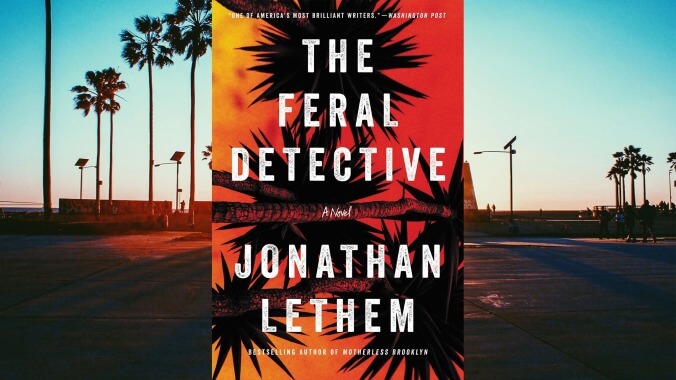
A woman walks into a private investigator’s office with a case. She’s not from around here, and she’s clearly trouble, but the investigator takes the job anyway. It won’t stay professional, of course. The two will wind up romantically entangled even as the job brings up parts of the investigator’s past that he’d rather stay buried. The plot of Jonathan Lethem’s The Feral Detective sounds like classic noir, except rather than following the detective, it’s about the woman offering the title character a job. And that’s a problem.
While there has been a constant stream of nonfiction written about the Trump administration, The Feral Detective might be the first major novel to explore the impact of his election. The story feels born from the first Saturday Night Live cold open following Trump’s victory, where Kate McKinnon performed Leonard Cohen’s “Hallelujah” as a eulogy for both the recently passed singer-songwriter and Hillary Clinton’s campaign. Following the election, The Feral Detective’s Phoebe Siegler, an embodiment of the shocked liberal elite, quits her job at The New York Times to try to track down her friend’s missing daughter, Arabella. Phoebe believes Arabella has traveled to California to visit the Mt. Baldy Zen Center, but gets no answers from the local police. So she brings the case to Charles Heist, who’s known for his ability to find people among the area’s communities of homeless individuals and hippies living off the grid.
Like the election itself, Phoebe’s story feels like a failure of feminism. Phoebe tries to get involved in every aspect of Heist’s investigation. She even uses a stolen portable toilet to try to fortify a homeless settlement against a coming flood in hopes that it will earn her enough goodwill to get answers about Arabella. But she’s regularly sidelined, stuck waiting in her hotel room, or drinking wine in a mountain bar, or helping hippies collect sagebrush while Heist does the investigative work. A good noir always has a sense of mystery, and not really knowing what Heist is up to does produce that, but it comes at the cost of action and excitement. The pages are instead filled with Phoebe’s inner monologue as she frames even the most harrowing moments of her journey with Heist as another entry in the series of soul-searching pilgrimages liberal journalists made to Trump country following November 2016.
“One part of my brain was still busy composing the red-state tell-all op-ed, the career I’d salvage from the ruins, my triumphant return to New York with surefire viral content,” Phoebe thinks.
Lethem’s last detective novel, Motherless Brooklyn, now nearly 20 years old and whose film adaptation is set to be released next year, had touches of the self-aware and absurd, but both elements are laid on far more thickly here. Phoebe narrates the clichés that are in place when she first visits Heist’s office, wondering as he listens to her if he’s about to reach into a drawer for a gun or bottle of whiskey, only to be surprised when he emerges with an opossum—the “Feral Detective” moniker comes from his affinity with animals and a pair of off-grid tribes dubbed the Rabbits and Bears. But lamp-shading tropes doesn’t help if they’re just played straight. Phoebe seems to fall for Heist because the genre demands it, first coming onto him after a booze-heavy dinner in the mobile home the gruff man shares with three tracking dogs.
“I’d go home with a California story or two in my back pocket. No, sorry, I didn’t ever set eyes on the ocean or the Hollywood sign, but did I tell you the one about the porta-potty levee? The trailer park blowjob? Oh, what a Manic Pixie Am I?” she muses. Later she reflects on her complicated relationship with Heist: “I had the distinct impression that I was kissing a sculpture, an odd and interesting statue, the interior of which was solid to the core, and inaccessible. I felt us as two topographies, abutting, yet lonely inside. But for all that, hey, it wasn’t bad.”
When Lethem fully embraces the absurd, the story is a lot more entertaining. The book explores how politics can simultaneously matter a great deal and not at all as Phoebe brings her priorities to a realm where the tribal divisions are even more literal than those between Americans who vote red or blue. Her feelings of being out of her element in the California desert and bewildered with her country bubble over spectacularly in a rant given to the audience of a ritual battle for leadership of the Bears: “DO YOU EVEN KNOW WHAT’S GOING ON, YOU STUPID FUCKING ASSHOLES? DID YOU FUCKERS EVEN VOTE?”
Because Phoebe exists on the periphery of the plot, Lethem offers few answers about the motives and stories of the other main characters or the methods that Heist uses to uncover them. This journey-over-destination approach to mystery is deeply unsatisfying. Phoebe might find what she went West looking for, but readers won’t get a worthy detective story.